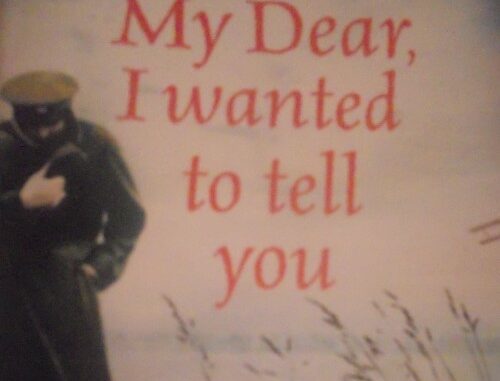
My Dear I Wanted to Tell You is a First World War novel whose narrative flits between London, France, and Sidcup UK. The main story is told through the eyes of soldier Riley Purefoy, and VAD nurse, Rose. Working class Riley signs up for war straight away, leaving his middle-class childhood sweetheart, Nadine, behind in London without any explanation. But the romance continues throughout scarce letters that they begin to send to each other. Meanwhile, Riley meets Captain Locke, whose wife Julia is missing him terribly back home in Sidcup, and whose cousin Rose is working in France as a voluntary nurse. Locke then promotes Riley to an officer, and as the plot thickens, the events unfold in a way that you would never imagine and all five character’s lives become entwined.
The book mainly explores the emotional and physical pain of war (Riley), as well as post-traumatic stress disorder (Locke), and is very accurate with its historical information of battles, places in France, and dates (well, the author Louisa Young IS Kathleen Scott’s grand-daughter!), as well as medical terminology about how soldiers’ faces were re-sculptured and put back together, which very eye-opening and interesting to read. However, over the few chapters that involved the soldier’s healing face, the self-pity over three chapters got a little boring and annoying. Now of course if you were a soldier suffering like that you would have course have been feeling down and depressed with everything you had been through in France, probably not caring whether you were getting better or not. However, this is a fictional account, and for the reader the self-pitying does become rather unbearable. Maybe if it had been a work of non-fiction, this would have been different.
Also, linguistically and grammatically, a few sentences were a little confusing without the use of commas or conjunctions, as the phrase could usually have had more than one meaning, and had to be read a couple of times over for it to fit in with the rest of the paragraph.
Finally, considering that the whole book was supposed to be a love-story, the ending did not have the anticipated finale or even the desired effect of a romance novel. (Surprisingly, there were no tears at the end for once, which, to someone who even cries at a few Dsiney films, is very disappointing for a said love-story!)
So, if you want to read about how war’s emotional and physical effects affect individuals in different ways, battle locations. and how surgeons re-pieced together soldiers’ faces in the First World War, then go ahead, then My Dear I Wanted to Tell You is definitely the book for you!
…If not, stick to Birdsong.

Leave a Reply